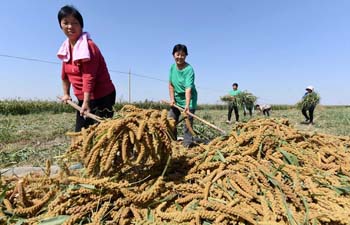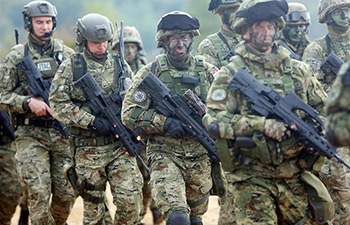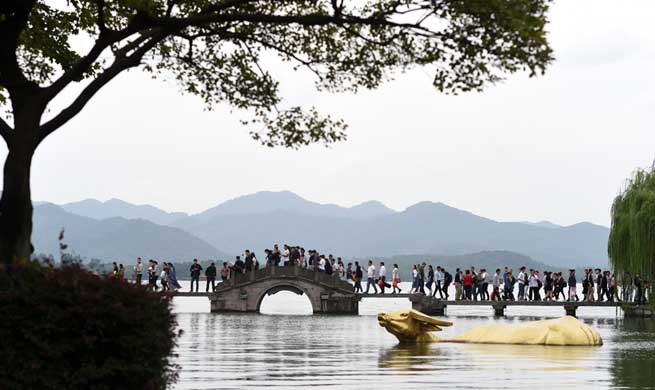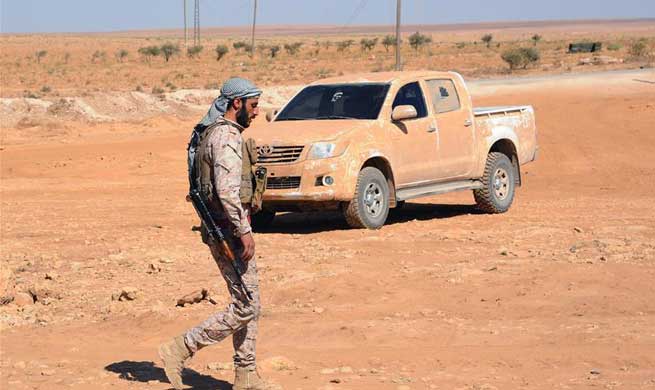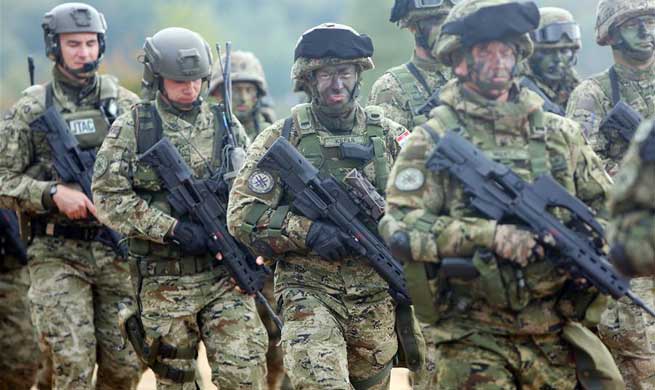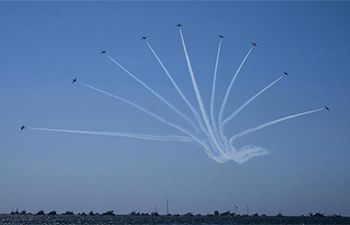TOKYO, Oct. 4 (Xinhua) -- Two reactors in Niigata Prefecture on the Sea of Japan coast run by the embattled Tokyo Electric Power Company Holdings Inc. (TEPCO) were cleared Wednesday to restart by Japan's nuclear watchdog.
The clearing of the government's safety standards however sparked harsh condemnation and saw protests from citizens affected by the nuclear crisis at the tsunami-ravaged Fukushima nuclear plant more than six years ago.
TEPCO's Nos. 6 and 7 reactors at the Kashiwazaki-Kariwa power station will be the first nuclear complex to soon be green-lit by the Nuclear Regulation Authority (NRA) under tighter safety requirements introduced in the wake of the 2011 disaster.
The nuclear regulator unanimously accepted TEPCO's draft assessment for the two reactors at the Kashiwazaki-Kariwa complex that has a total of 7 reactors and is one of the largest nuclear plants in the world.
Citizens here have slammed the move, although the assessment by the utility states that safety measures for the two reactors meet the new safety requirements, including new equipment and protocols put in place to deal with serious accidents, for an instance, the leaks of radioactive materials from damaged containment vessels, as was the case in Fukushima.
Protests were held on Wednesday by anti-nuclear activists, civic groups and evacuees still displaced in the wake of the 2011 disaster, outside the building in central Tokyo where the NRA held its meeting to endorse TEPCO's passing of its safety review.
Similar demonstrations also took place in the vicinity of the Kashiwazaki-Kariwa power station in Niigata Prefecture and other places in Japan.
Those protesting, most notably, also comprised those who still remained displaced, after having been forced to evacuate Fukushima after the disaster that saw huge amounts of radioactive materials released into the air, the land and the Pacific Ocean.
"It appears that things are moving forward as if the Fukushima nuclear crisis is over," Hiroko Matsumoto, 68, who still lives in a temporary accommodation away from her home in Fukushima, was quoted by local media as saying Wednesday.
"I want TEPCO never to forget that a serious nuclear accident can cause enormous damage," Matsumoto said.
Similarly, Nobuko Baba, 76, who lives near the Kashiwazaki-Kariwa plant said that she was shocked by the NRA "softening its stance towards TEPCO so quickly."
She added that such a hasty decision could not guarantee people's safety and that the decision to restart the idled reactors should be made by the citizens of Niigata Prefecture.
"Whether to resume operation of the two reactors should be the decision of Niigata Prefecture citizens. I am counting on Gov. Ryuichi Yoneyama who has been wary about it," Baba was quoted as saying.
Yoneyama has said that the restart decision will not be made without further investigation into the Fukushima crisis.
He said the probe could take as long as four years to complete.
On Sept. 13, the NRA postponed clearing the two idled reactors from restarting, on grounds the utility may be unfit to run a nuclear power plant and for there being a lack of debate on the restart.
The NRA has been critical of TEPCO's management, including its safety awareness, and had said previously that, "An operator, who cannot take concrete measures to decommissioning efforts of the Fukushima Daiichi power plant, does not have the right to resume operation of nuclear reactors."
The utility was urged by the NRA to provide concrete details on how it plans to deal with contaminated water at the disaster-hit Daiichi nuclear facility in Fukushima, yet failed to give details in its written response, adding to public fears about the utility's safety protocols.
The reactors to be restarted, much to public consternation, would also be the first of Japan's boiling-water-type reactors to be brought back online after the 2011 disaster.
These are the same type of reactors that underwent multiple meltdowns at TEPCO's Fukushima plant when its primary and backup cooling systems were knocked out by the earthquake-triggered tsunami.
The NRA said it plans to allow the public to express opinions for a month starting on Thursday, prior to it underwriting its initial approval, a move blasted as hollow by some protestors.
"I think its all about money over safety and that's why the NRA is under pressure to back TEPCO," said Shunichi Yamamoto, 59, an anti-nuclear activist, holding a placard with: "No Nukes," "TEPCO OUT" and "TEPCO Doesn't Care!" written on it.
"It's obvious after all the trouble TEPCO has had since the disaster and the fact that the crisis is still continuing, that TEPCO is unfit to operate nuclear plants," Yamamoto insisted.





